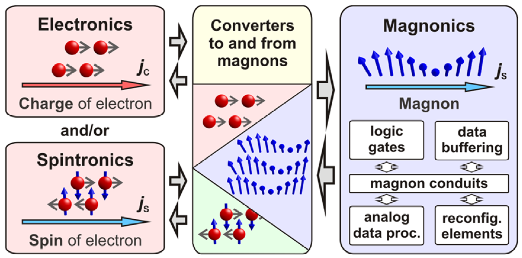Here you will find information about positions that are currently open in the group. You can apply for any PhD positions through the University website.
PhD in “Spin wave dynamics for spintronic computational devices“.
Spin waves (magnons) are fundamental excitations found in magnetically ordered materials. Recently spin wave phenomena have been proposed as a new paradigm for dedicated computational tasks due to the inherently low energy of this type of excitation. Spin waves have high potential for nanostructured magnetic devices able to perform a set of important computational tasks such as pattern recognition, convolution, and Fourier transformations. Additionally, the generation, detection and manipulation of spin waves are key enabling technologies for microwave processing, magnetic sensing as well as for unconventional logic.

In order to understand the potential of spin waves, the physics of new materials needs to be explored. It has very recently been realized that high frequencies, towards THz, can be generated using antiferromagnets and we have already succeeded in demonstrating high frequencies from a synthetic antiferromagnetic system [2] which provides a solid platform for this project. Similarly, exploring the potential of materials with perpendicular anisotropy (PMA) provides exciting avenues for developing spin wave technologies. For example, there is a class of thin films with L10 ordering (MnAl, FePt, MnAlGe, FePtPd) which possess the very high PMA needed to generate high frequencies. Extensions to these ideas are so-called hybrid systems, where in addition to a layer containing perpendicular magnetization other 2D layers with including those with in-plane anisotropy [3].
In this project, the aim is to develop the understanding necessary to create high frequency spin wave devices using the emerging ideas for new atomically engineered materials. This is an experimental project involving depositing and characterization of atomically layered magnetic films, creating devices using lithography and measuring them using ferromagnetic resonance (FMR) and advanced electrical measurements (e.g. non-local geometry) to understand their high frequency properties. The project will use the state-of-the-art instrumentation and facilities for magnetism and nanodevice research in Manchester where we have a wide range of nanoscale magnetism activities. There will also be opportunities to interact with our existing collaborators in laboratories across Europe.
[1] R.L. Stamps et al. “The 2014 Magnetism Roadmap” J. Phys. D: Appl. Phys. 47 (2014) 333001
[2] Waring et al. In preparation.
[3] Wohlhüter et al. “Nanoscale switch for vortex polarization mediated by Bloch core formation in magnetic hybrid systems” Nature Comms. 6 (2015) 7836.
PhD in THz Spintronics
We are looking for a student to investigate the generation of THz pulses of radiation from spintronic structures to reveal the physics that governs the properties of these remarkable material systems and optimise spin-based structures for the emission of THz radiation. The work is experimental in nature and encompasses a number of areas, such as the fabrication and characterisation of metallic thin-film emitters and the investigation of the THz characteristics of such systems. The project will support a recently awarded UKRI EPSRC-funded project focused on understanding the THz emission process from spintronic structures.
Further information can be found on the findaphd website.